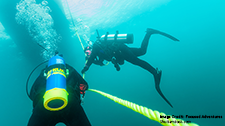Stockholm Center for Research and Innovation Security

The Stockholm Center for Research and Innovation Security (SCRIS) is an independent and sustainable thematic center at the Institute for Security and Development Policy (ISDP).
The thematic center has an international focus with an emphasis on cooperation between the U.S., EU and like-minded states. It aims to create an environment of awareness over concerned topics such as appropriation of know-how and proprietary information and its impact on the economic development of individual nations. The center’s research and activities focus on issues of securitization within Innovation, Critical Technology, IP protection, Technology transfer, R & D, and Manufacturing.
A Platform for International Collaboration
The SCRIS provides a platform for international collaboration, helping to increase the exchange of innovative ideas while also drawing attention to ongoing challenges in research and innovation security. The center aims to be a hub connecting the complex networks linking the EU, US, and Indo-Pacific. It focuses on the exchange of innovative ideas while highlighting the ongoing challenges of research and innovation security. Hence, the center focuses on engaging researchers, academics, and non-governmental organizations (NGOs) invested in the field of economic and political progress through entities like NATO and the EU, as well as entities in the Indo-Pacific region. The aim is to involve diplomats, foreign affairs professionals, businesses involved in research and scientific innovation, and policy makers keen on leveraging research for diplomatic initiatives.
Conferences & Webinars
The center hosts open conferences, webinars, and fireplace discussions to raise awareness about its key issues, offering a global platform where important findings can be shared with a wider audience.
The center’s digital Research and Innovation Series (RIS) brings together scholars and experts from diverse fields and backgrounds. The series aims to promote dialogue and exchange of ideas related to research and innovation, and to further increase the understanding of the many factors and policies that impact security developments.
The SCRIS also organizes private, closed-door meetings and dialogues, creating a space for open and confidential conversations between key stakeholders and involved parties.
Training Programs on Research and Innovation Security
The SCRIS serves as a regional training hub offering workshops, seminars and training courses on research and innovation security. Most of the workshops and seminars contain detailed briefings, presentations of case studies, reviews of recent scholarships, discussions among participants, and hands-on exercises. While content will vary in scope and depth based on the course length and participants’ backgrounds and experience, key goals include:
- Increase participants’ knowledge of malign states/actors’ policies, programs, methods, and supporting infrastructures to influence, acquire, and transfer technology and knowhow through legal and illicit means, which pose risks to research-performing organizations. This includes understanding how to assess national and economic security risks.
- Understand the types of research integrity risks that research organizations may encounter when engaging with malign actors. These include transparency, reciprocity, ethical, and reputational concerns.
- Apply the knowledge gained on specific entities and programs to bolster robust due diligence and risk assessments conducted by governments, academic institutions, and private sector entities.
Workshops and seminars can be customized to fit the needs and skills of attendees. They can include case examples and exercises to help identify risks to the participating institutions.
Research
The SCRIS brings together a team of experts and a broad network of fellows to conduct cutting-edge research across diverse fields. This is a non-exhaustive list of thematic areas on research and innovation security that could address many of the deficiencies and persistent knowledge gaps that exist in the U.S., EU, and the Indo-Pacific:
Innovation and R&D: The EU, like the United States, faces significant challenges in safeguarding its innovation and Research and Development (R&D) ecosystem from external threats posed by state actors like the PRC, Iran and Russia, with several critical challenges hindering its capabilities to effectively protect its scientific and technological assets. As such, the center highlights the intricacies and interdependence of modern-day innovation and R&D whilst emphasizing the importance of improved policies or the protection of intellectual property in academia, policy and business.
Studies on PRC Knowledge Transfer Methods: The PRC increasingly acquires knowledge and technology from Europe and QUAD-member nations. This research theme examines the mechanisms and methods behind this acquisition, like PRC talent programs, start-up contests, and recruitment networks, replicating proven methodologies from previous studies in the U.S., Australia, and France. The research aims to identify and assess the infrastructures and entities in Sweden, Europe, and China that facilitate these transfers, providing insights tailored for policymakers while also creating versions suitable for public understanding.
Critical Technology Vulnerabilities: In an era of rapid technological advancement, the intersection of research, innovation, and national security has gotten ever closer. China and Russia’s partnership has had immense strategic importance, understanding and managing our critical technologies has never been more critical. This research theme focuses on evaluating collaborative efforts in critical technology fields between Sweden, other nations, the PRC, and Russia, with their technology subdisciplines for NATO and the EU, offering insights for policymakers in the EU, NATO, and QUAD nations. Adaptable versions of the findings can cater to broader audiences, including the public and private sectors, with in-depth technical assessments available for specialized stakeholders.
Broader Understanding of PRC Research Entities Linked to the Defense Industry: The international research community continues to be limited by persistent and large knowledge gaps on PRC research organizations tied to China’s military or defense industrial base.
Many subsidiaries and research institutes subordinate to PRC defense state-owned enterprises (SOEs) are not on the U.S. or EU sanctions or trade control regimes (such as export control entity lists). Many of these research institutions act like academic organizations and collaborate with U.S. and European universities. Significant knowledge gaps remain regarding the identification of many of these research institutions, their missions, types of research conducted, and key personnel. This project addresses these knowledge gaps by cataloging research organizations owned or controlled by defense SOEs and their subsidiaries.
Through these efforts, the SCRIS aims to create a sustainable foundation for ongoing dialogue and collaboration between the U.S. and EU, Indo-Pacific, and likeminded nations, particularly in the Nordic and Baltic regions, increasingly becoming focal points for technological development and potential threats from malign actors.
Related News
Related Publications
-
“Strategic Autonomy, Anyone?” Charting Europe’s Shifting Security Debates and 2024-2029 Priorities
Executive Summary Policymakers are preparing for the 2024-2029 EU legislative period in a dramatically changing geopolitical landscape. With escalating wars and humanitarian crises on its borders, shifting trade dynamics, deindustrialization […]
-
China, Russia and Undersea Cable Vulnerability: Shoring Up Protection
The global undersea cable network, carrying up to 99 percent of international internet traffic, faces increasing vulnerabilities. Recent incidents in the Baltic Sea and around Taiwan highlight the urgent need […]
-
Elevating Democracy via Transatlantic Collaboration
In collaboration with the U.S. Embassy in Stockholm, the Institute for Security and Development Policy (ISDP) organized a series of conference events from March 11 to 14, 2024, held in […]
-
The US and EU, and the Emerging Supply Chain Network: Politics, Prospects, and Allies
The Global Supply Chains have evolved from simply logistical achievements to being the bedrock of the global economy. Driven by technological advances and geopolitical shifts, this transformation underscores the critical […]
-
Safeguarding intellectual property in the wake of digital authoritarianism: An Interview with DR. REBECCA SPYKE KEISER
Dr. Rebecca Spyke Keiser is the Chief of Research Security Strategy and Policy (CRSSP) at the National Science Foundation (NSF). The U.S. National Science Foundation is an independent federal agency […]




